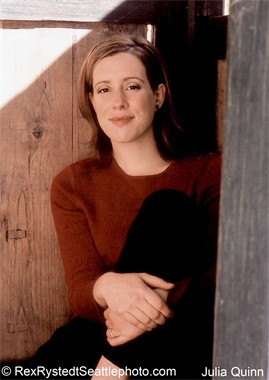Must Love Austen: Julia Quinn talks about inspiration, Austen & Sir Richard Kenworthy

 The Secrets of Sir Richard Kenworthy is, in many ways, my salute to Jane Austen. The very first line reads:
The Secrets of Sir Richard Kenworthy is, in many ways, my salute to Jane Austen. The very first line reads:
To quote that book his sister had read two dozen times, it was a truth universally acknowledged that a single man in possession of a good fortune must be in want of a wife.
But of course, I’m not Jane Austen, and my hero most definitely is not Mr. Darcy. Hence the next two lines of the book:
Sir Richard Kenworthy was not in possession of a fortune, but he was single. As for the wife… Well, that was complicated.
Thus the tone was set, and before I knew it, my heroine was having a lively discussion about Pride and Prejudice with her sister. (Much to the confusion of their mother, who did not realise that Lizzy, Darcy and Mr. Collins were fictional characters.)
Jane Austen’s books endure in a way that few would have predicted at the time of their publication. I believe it’s because she was writing about smart women in a time that did not celebrate smart women. She was writing about love and happy endings in a time that viewed marriage – in her social class, at least – as more of a business contract than a bond of love. I’d like to think that my books honour Austen by adhering to these ideals. I don’t write stupid heroines (nor stupid heroes), and everyone gets a happily-ever-after.
In 2007 I was asked to write the Afterword for the new Signet Classics edition of Mansfield Park. It is still one of the highlights of my career, and I’d love to share a bit of it with you.
I am an author of historical romances, which means that I spend an inordinate amount of time in front of my computer, dreaming of witty men, wittier women, and ways to torture them both before allowing a happily-ever-after. I know the difference between a duke and an earl (and the proper way to address each, both in person and in writing), and I regularly find myself researching such strange and random bits of knowledge as the journey length from Liverpool to Dublin in 1819, the location of Boucher’s Portrait of Marie-Louise O’Murphy during the same year, and the earliest known usage of the phrase “Little Bo Peep.” (At least twelve hours, Germany, and Shakespeare, as far as I can tell.)
Like most authors writing in my time period, I worship at the altar of Jane Austen, and while I do not credit her with the birth of the modern romance novel (what she did and what I do are far too dissimilar for that), she must be acknowledged as the genre’s most vital and influential ancestor.
Three cheers for Miss Austen!
 Julia Quinn started writing her first book one month after finishing college and has been tapping away at her keyboard ever since. She is a graduate of Harvard and Radcliffe colleges and lives with her family in Colorado.
Julia Quinn started writing her first book one month after finishing college and has been tapping away at her keyboard ever since. She is a graduate of Harvard and Radcliffe colleges and lives with her family in Colorado.






